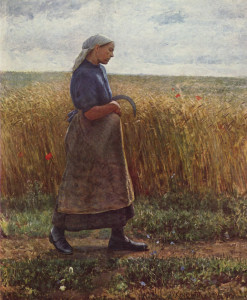July comes to a close and August begins: this is Lammastide, an old holiday few will recognize, yet one very valuable, Lammas helps us begin our gradual transition from summer to fall. Indeed, it is the start of the autumnal season in traditional reckoning of time, for here in the Northern Hemisphere we are now halfway between the summer solstice of June and the autumnal equinox of September. This makes Lammas one of the cross-quarter days, like Imbolc at the start of February, which brings the start of spring to a winter-weary world.
Lammas is perhaps more bittersweet, for it is more difficult to be weary of such a gentle season as summer. But in the spiraling circular nature of time, everything is in flux, and each day since Midsummer in June has brought us increasing darkness. The days will continue to grow shorter and shorter until Midwinter’s solstice in December. The weather may lag behind somewhat, but there is no question that summer is ripening and growing old. In the fields, the grain is ripening, and the first harvest traditionally took place right about now. This is the origin of Lammas. The name comes to us from the Anglo-Saxon Hlafmass, or “Loaf-mass,” and at Lammastide, the first loaf of bread would be baked from the newly harvested grain and brought to the church to be blessed. All labor would cease and there would be community gatherings, perhaps the precursors of our contemporary county fairs that begin to pop up this time of year and which also, at their heart, celebrate agriculture and the harvest.
Grain yields not just bread but also whisky and ale, and all of these things play a part in Lammastide celebrations. If you are celebrating with us, Lammastide begins tonight with Lammas Eve and continues on to Lammas tomorrow, the First of August. The needs for a proper celebration are simple: a good loaf of bread and a festive beverage should be your table’s focal point. Some bakers make elaborately shaped breads just for Lammas, but simple is good, too. Never underestimate the power of simplicity.
Lammas was a big deal in Elizabethan England, and William Shakespeare brought some of the symbolism of Lammas into his tragedy Romeo and Juliet, symbolism that perhaps escapes our modern sensibilities. The play takes place in the heat of July, just before Lammas. Juliet’s nursemaid in Act I describes the fair Juliet and tells us, “On Lammas-Eve at night shall she be fourteen.” English majors like me who love to find connexions in these things almost always view Juliet in terms of the sacrificial first harvest. She is, in fact, in her tomb before Lammas arrives, less than a week after meeting Romeo. (Sorry for the spoiler… and try topping that next time you’re complaining about having a bad week.)
You may also hear this time of year called Lughnasadh––this is the Celtic version of Lammas. The celebration is much the same. Our suggestion, as you might easily assume, is to celebrate and mark this day. We are not, for the most part, an agrarian people anymore, and this explains the waning of a celebration like Lammas. But we rely on those who grow the grains we eat, and so why not set some time aside to enjoy with gusto the fruits of their labors––the farmers, the bakers, the brewers and distillers. Honor them, honor the bread you eat, the ale you drink, celebrate with us this first harvest as we begin to set our sights toward autumn.
Image: Sommer by Leopold Graf von Kalckreuth. Oil on canvas, 1890. [Public domain] via Wikimedia Commons.


